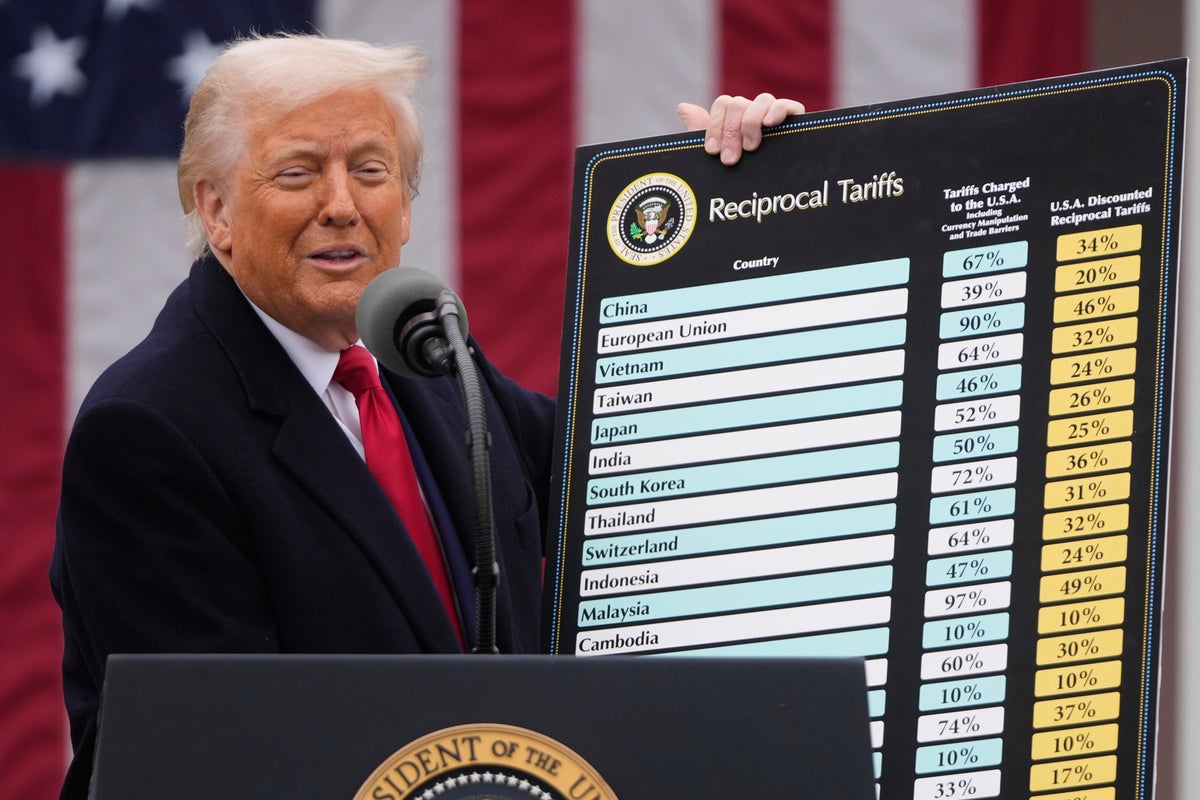British firms have been hit by a 10 per cent tariff on all exports to the United States as Donald Trump ushered in a new era for global trade and pledged America “will no longer be ripped off”.
The US president said his “liberation day” announcement – in which some nations will pay as much as 34% – was a “declaration of economic independence.”
It means that Keir Starmer’s government has failed to secure a carve-out for Britain from tariffs, but while the UK was 13th on a “naughty list” of nations brandished at a White House press conference it had the joint lowest tariffs along with nations such as Brazil.
European Union nations face 20% penalties while China will pay 34% and Cambodia an eyewatering 49%. Switzerland was also hit hard with 31 per cent, Taiwan, which is struggling for survival against threats from China, faces 32 per cent and India is getting 26 per cent.
A Downing Street source said: “We don’t want any tariffs at all, but a lower levy than others vindicates our approach. It matters because the difference between 10 per cent and 20 per cent is thousands of jobs.
“We will keep negotiating, keep cool and keep calm. We want to negotiate a sustainable trade deal, and of course to get tariffs lowered. Tomorrow we will continue with that work.”

After days of build up the US president waited for markets to close to make his big announcement in the White House rose garden on what he has dubbed “liberation day”, a historic move which turned the world order on its head.
He was surrounded by his cabinet, congressmen, senators, automobile workers and farmers as he promised “to make America wealthy again”.
He said: “April 2nd 2025 will forever be remembered as the day. American industry was reborn the day. America’s destiny was reclaimed and the day that we began to make America wealthy again. I make it wealthy good and wealthy. For decades, our country has been looted pillage raped and plundered by nations near and far, both friend and foe alike.
“Americans really suffered gravely. They watched in anguish as foreign leaders have stolen our jobs, foreign cheaters have ransacked our factories and foreign scavengers have torn apart.
“Our country and its taxpayers have been ripped off for more than 50 years, but it is not going to happen anymore.”
At one point the president introduced an automobile worker on to the stage to talk about how car plants in the state of Michigan had been forced to close because of foreign competition.
The president listed a series of grievances noting that tariffs on cars in South Korea and Japan prevented Americans from entering the market. He complained of 20 per cent VAT taxes on sales in the EU which also applied to Britain. And he claimed dairy products to Canada were getting hit by tariffs of more than 200 per cent.
While the UK got little mention, apart from a reference on his list, it is still getting the base level of 10 per cent tariffs, although that is half the level it would have had if it was still in the EU.
Ministers knew it would be impossible to avoid the measures after Trump made clear he was imposing tariffs on cars. Around 17 per cent of UK cars go to the US market and already the Institute of Public Policy for the Regions (IPPR) has estimated it will cost Britain 25,000 jobs.
Trump has claimed his new tariff regime will “rebalance trade” with America and “stop countries taking advantage” of the US.
He had already announced that he would impose 25 per cent tariffs on all automobiles, steel and aluminium imports to America which included the UK.
Business secretary Jonathan Reynolds made it clear there would be no knee jerk response.
He said: “We have a range of tools at our disposal and we will not hesitate to act. We will continue to engage with UK businesses including on their assessment of the impact of any further steps we take.
“Nobody wants a trade war and our intention remains to secure a deal. But nothing is off the table and the government will do everything necessary to defend the UK’s national interest.”
Earlier the prime minister resisted calls for him to turn his back on America and concentrate on rebuilding relationships with the EU as the main trading partner.
During PMQs Liberal Democrat leader Sir Ed Davey urged the Prime Minister to join other nations in an “economic coalition of the willing” to respond to the US tariffs.
But Sir Keir described Sir Ed’s proposal as “a false choice” and insisted that he would not abandon hopes of a trade deal with the US.
He told MPs: “A trade war is in nobody’s interests and the country deserves – and we will take – a calm, pragmatic approach.”
Tina McKenzie, policy chair of the Federation of Small Businesses (FSB), said: “Tariffs will cause untold damage to small businesses trying to trade their way into profit while the domestic economy remains flat.”
Conservative shadow trade secretary, Andrew Griffith, said: “Labour failed to negotiate with President Trump’s team for too many months after the election, failed to keep our experienced top trade negotiator, and failed to get a deal to avoid the imposition of these tariffs by our closest trading partner.”

